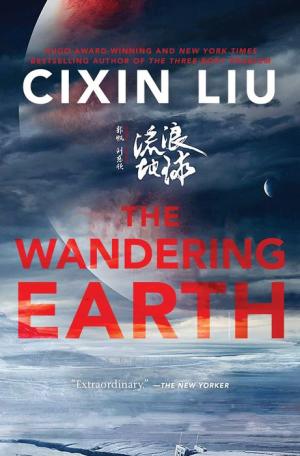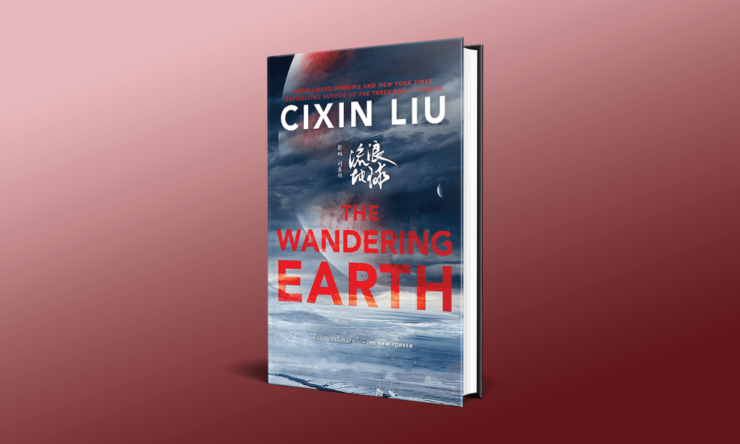Cixin Liu is an ideas guy—a Big Ideas guy. Much of his writing, notably the epic Three-Body Problem saga, spans thousands and even millions of years. Even if you’re not a fan of technical hard sci-fi that leans on the dry side of storytelling, you have to give it up for the scope of his ideas as he marries the mundane human world with far-reaching cosmic changes that take place over millennia.
A typical Liu story often follows a familiar path: dispassionate alien civilization comes to Earth with technology beyond our ken, humanity bands together in the face of potential disaster, usually with a clinical resolution that hammers home our insignificance in the universe. By the time you get there, though, it’s usually after a marathon through talking-head dialogue and looming walls of exposition that reinforce the impossible galactic scale and scope of the problems at hand. The titular story in The Wandering Earth anthology is no different, and probably the most forgettable of them all (it’s also nothing like the Netflix film adaptation of the same name, which is more of an action blockbuster focused on a pair of sibling protagonists).
Where Liu really shines at his craft is in micro-explorations of smaller, more intimate story arcs. The second story, “Mountain,” revolves around a disgraced ex-mountaineer who takes refuge on a ship and ends up having to scale an unexpected peak. Instead of a rotating ensemble cast of dozens who struggle as tired specks in a thankless void of jargon and scientific name-dropping, “Mountain” allows its sole protagonist enough breathing room to actually be a person, at least until it devolves into a play-by-play retelling of an entire civilization’s development.
Buy the Book


The Wandering Earth
“Sun of China” starts off with an engaging, semi-allegorical tale of an ordinary farmer’s son following another man’s capitalist dream to Beijing. But post-prologue, it stumbles into an overly heavy-handed look at class politics that were already there and didn’t need to be extra-spelled out. The idea of introducing an untrained nobody into the elitist realm of space travel strikes universal chords of classism and military exceptionalism—both of which played a critical role in China’s space travel history—but Shui’s narrative momentum dissolves into a generic resolution that repeats old beats—man makes a surprisingly easy choice to sacrifice his life and family in the name of humanity, man is nothing but a footnote. This is arguably the point of a lot of grand hard sci-fi but it’s delivered in the same flat affect as much of Liu’s other work and feels like a waste of Shui’s hard-won journey.
“For the Benefit of Mankind” is where Liu really starts to have fun. It’s a story about a hitman drawn into a larger scheme by a cabal of ultra-powerful billionaires, and even when Liu’s staple tropes—ancient aliens from a different version of Earth who want to take over our planet—show up, his uncharacteristic genre experiments with noir and mystery make for a sharp, engrossing read.
The character of the Last Capitalist, an obvious stand-in for real billionaires in the age of Amazon, adds bleak humor to a very real speculative nightmare where the aforementioned capitalist owns the entire planet and leaves the rest of us to rot in tiny pods. “We had to swallow pill-sized air meters before we went out, which measured exactly how much air we breathed,” a visiting alien tells the protagonist, Smoothbore. “Every time we inhaled, a fee was deducted from our bank account. This was a luxury for most of the poor…we never dared to exert ourselves while outdoors. We mostly just sat and controlled our breathing. Before we returned home, we had to carefully scrape the soles of our shoes, because the soil outside was not ours to keep.”
But it’s “Curse 5.0” that barrels out of nowhere to become an instant favorite—a completely deranged, snort-out-loud funny tale of cybercrimes and personal revenge where Liu inserts a hilariously debauched caricature of himself (and fellow Chinese sci-fi author Pan Hai-tian, here dubbed Pan Daijao after one of his most well-known works) into the picture. One of its many lovely literary sublimities is a brief but evocative comparison of a livid programmer—the original author of the Curse 1.0 computer virus—to “The Silesian Weavers,” a controversial political poem in 19th century Germany. From there, “Curse 5.0” builds and swells as the eponymous curse grows larger and more complex, poking fun at the sci-fi publishing complex, and adding masterful layers to a modern classic. Where some of Liu’s other work weaves in satirical elements that don’t always work effectively within a larger story, Curse 5.0 is pure distilled genius and I loved every second of it.
Whenever Liu unhitches himself from the hard sci-fi space opera wagon, the impact is immediately palpable—the passion in his writing becomes an unstoppable force. These are the stories that really leap off the page and stick with you long after you’re done. The Wandering Earth anthology’s biggest challenge is sandwiching its meatiest and most delightful stories in between lengthy screeds that more often than not, feel like thin regurgitations of thought experiments, clinically retold oral histories, and mountains of research. Liu’s bread and butter might come from grand sagas that span universes and eons, but his speculative worlds, at least in this anthology, pack a stronger punch on a smaller, more intimate scale.
The Wandering Earth is available from Tor Books.
Alexis Ong is a freelance culture journalist with weak ankles who mainly writes about games, tech, and pop culture. Her work has appeared in The Verge, Polygon, Kotaku, Rock Paper Shotgun, VICE, Dazed Digital, and more; soft spots include science fiction, internet archaeology, comics, boxing, and old games. You can find her at her website or on Twitter.










